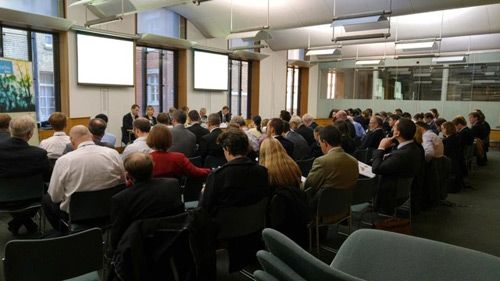

Launched in Parliament last week, Carbon Connect’s latest inquiry report, Policy for Heat: Transforming the System was received by a full house of sector experts and parliamentary specialists.
Sponsored by Energy & Utilities Alliance (EUA) and the Institution of Gas Engineers and Managers (IGEM), the report is the second in a cross-party and independent inquiry series.
The report, chaired by shadow transport minister, Jonathan Reynolds MP, and the newly elected conservative Rebecca Pow MP, argues that we should be embarking on a nationwide transformation in the way we heat our homes and buildings.
Transforming the System calls for the next government to ramp up delivery of low carbon heating and energy efficiency measures and contends that there is no one solution to cutting emissions from building heat, and instead we are heading towards a ‘mixed future’ of technologies and fuels.
Heat for buildings must be decarbonised if the UK is to meet its 2050 carbon budgets and end fuel poverty. According to new official government figures and definitions of fuel poverty, there are currently 2.35 million households in fuel poverty in England alone. This is ten percent of all households in England. Increased integration between renewable heat and energy efficiency policies could put the government in a better position to effectively target fuel poverty, whilst also setting the country on a path to decarbonisation in the most cost-effective way possible.
The Parliamentary reception included a panel debate chaired by Jonathan Reynolds MP and Rebecca Pow MP with Dan Osgood, heat director & directorate business manager at DECC, Stewart Clements director of HHIC, Chris Clarke, president of IGEM, and Jenny Hill from the Committee on Climate Change.
Experts from the REA, Arup, the Carbon Trust and the Energy Saving Trust were among the audience and the debate certainly heated up on the topic of how district heating could be implemented for individual householders, the practicality of installing renewable technologies into homes and the funding that DECC is currently reviewing for low carbon technologies.
There were concerns over the government leading this campaign for a low carbon future, with the panel members and audience discussing the importance of not only implementing and firmly backing low carbon technological changes in policy and materially, but also encouraging social acceptance as part of this process. Any public resistance could delay a nationwide strategy. However the consensus was that with education there would be a social change that would enable governments to implement a long-term heat strategy across the country.
Transforming the System calls on the government to make solid plans beyond its five year term in office that ensure that the UK meets its 2050 carbon budgets and has a sustainable heating infrastructure in place. In 2014, only 4.9% of heat demand was met by renewables. The government has an ‘ambition’ (not an official target) to meet 12% of heat demand from renewable sources by 2020, at the moment this is looking unlikely. By including robust, ambitious policy frameworks to ensure that a market transformation in carbon heating is achieved, the government can more than meet these objectives for 2050.
With more than 70 experts and parliamentarians attending this report launch, it is evident that there is increased interest in the long-term heat strategy the government needs to lay out, and with Carbon Connect’s impartial inquiry approach, the message is clear: the government needs to urgently produce and implement a long term strategy for decarbonising heat for buildings in the UK.
